| Listing 1 - 9 of 9 |
Sort by
|
Book
ISBN: 1527534693 9781527534698 1527527107 9781527527102 Year: 2019 Publisher: Newcastle Upon Tyne, England : Cambridge Scholars Publishing,
Abstract | Keywords | Export | Availability | Bookmark
 Loading...
Loading...Choose an application
- Reference Manager
- EndNote
- RefWorks (Direct export to RefWorks)
This book discusses entropy and the Second Law of Thermodynamics in such a way that everyone can understand its subject matter. Entropy is one of the most interesting concepts in physics. Although it is a well-defined concept, it is still perceived by even well-known scientists as a concept cloaked in mystery. It is also the most misused, and often abused, concept in physics. In order to understand entropy, one needs to understand the Shannon measure of information, and in order to grasp this idea, one must be familiar with some basic concepts of probability. Therefore, this book consists of three chapters: the first discusses probability, the second addresses Information Theory, and the third considers entropy and the Second Law of Thermodynamics. Readers will discover that the Second Law is nothing but a law of probability.
Entropy. --- Entropy --- Thermodynamics --- Information theory --- Uncertainty (Information theory) --- Entropie --- Thermodynamique --- Information, Théorie de l' --- Incertitude (théorie de l'information) --- Study and teaching. --- Étude et enseignement
Multi
ISBN: 9780521517324 9780521741231 0521741238 052151732X 9780511840203 1107779057 1107776643 0511840209 Year: 2009 Volume: 45 Publisher: Cambridge: Cambridge university press,
Abstract | Keywords | Export | Availability | Bookmark
 Loading...
Loading...Choose an application
- Reference Manager
- EndNote
- RefWorks (Direct export to RefWorks)
This book describes the classical axiomatic theories of decision under uncertainty, as well as critiques thereof and alternative theories. It focuses on the meaning of probability, discussing some definitions and surveying their scope of applicability. The behavioral definition of subjective probability serves as a way to present the classical theories, culminating in Savage's theorem. The limitations of this result as a definition of probability lead to two directions - first, similar behavioral definitions of more general theories, such as non-additive probabilities and multiple priors, and second, cognitive derivations based on case-based techniques.
Quantitative methods (economics) --- Decision making --- Uncertainty (Information theory) --- Prise de décision --- Incertitude (Théorie de l'information) --- Decision Making --- Prise de décision --- Incertitude (Théorie de l'information) --- Business, Economy and Management --- Economics --- Decision making. --- Measure of uncertainty (Information theory) --- Shannon's measure of uncertainty --- System uncertainty --- Information measurement --- Probabilities --- Questions and answers --- Deciding --- Decision (Psychology) --- Decision analysis --- Decision processes --- Making decisions --- Management --- Management decisions --- Choice (Psychology) --- Problem solving
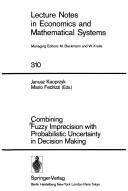
ISBN: 3540500057 0387500057 3642466443 Year: 1988 Volume: 310 Publisher: Berlin Springer
Abstract | Keywords | Export | Availability | Bookmark
 Loading...
Loading...Choose an application
- Reference Manager
- EndNote
- RefWorks (Direct export to RefWorks)
In the literature of decision analysis it is traditional to rely on the tools provided by probability theory to deal with problems in which uncertainty plays a substantive role. In recent years, however, it has become increasingly clear that uncertainty is a mul tifaceted concept in which some of the important facets do not lend themselves to analysis by probability-based methods. One such facet is that of fuzzy imprecision, which is associated with the use of fuzzy predicates exemplified by small, large, fast, near, likely, etc. To be more specific, consider a proposition such as "It is very unlikely that the price of oil will decline sharply in the near future," in which the italicized words play the role of fuzzy predicates. The question is: How can one express the mean ing of this proposition through the use of probability-based methods? If this cannot be done effectively in a probabilistic framework, then how can one employ the information provided by the proposition in question to bear on a decision relating to an investment in a company engaged in exploration and marketing of oil? As another example, consider a collection of rules of the form "If X is Ai then Y is B,," j = 1, . . . , n, in which X and Yare real-valued variables and Ai and Bi are fuzzy numbers exemplified by small, large, not very small, close to 5, etc.
Probability theory --- Statistical decision --- Fuzzy sets --- Uncertainty (Information theory) --- Prise de décision (Statistique) --- Ensembles flous --- Incertitude (Théorie de l'information) --- Management --- Business & Economics --- Management Theory --- 519.226 --- Decision problems --- Game theory --- Operations research --- Statistics --- Management science --- Sets, Fuzzy --- Fuzzy mathematics --- Set theory --- Inference and decision theory. Likelihood. Bayesian theory. Fiducial probability --- Fuzzy sets. --- Statistical decision. --- 519.226 Inference and decision theory. Likelihood. Bayesian theory. Fiducial probability --- Prise de décision (Statistique) --- Incertitude (Théorie de l'information)
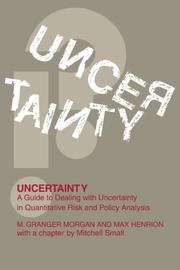
ISBN: 0521365422 0521427444 1139930087 1139927175 0511840608 9780521365420 9780521427449 9780511840609 Year: 1992 Publisher: Cambridge : Cambridge university press,
Abstract | Keywords | Export | Availability | Bookmark
 Loading...
Loading...Choose an application
- Reference Manager
- EndNote
- RefWorks (Direct export to RefWorks)
The authors explain the ways in which uncertainty is an important factor in the problems of risk and policy analysis. This book outlines the source and nature of uncertainty, discusses techniques for obtaining and using expert judgment, and reviews a variety of simple and advanced methods for analyzing uncertainty.
Uncertainty (Information theory) --- Incertitude (Théorie de l'information) --- Uncertainty --- Risk --- Policy sciences --- Mathematical models. --- Mathematical models --- Uncertainty - Mathematical models. --- Risk - Mathematical models. --- Policy sciences - Mathematical models. --- Policy analysis --- Risk assessment. --- Uncertainty. --- Reasoning --- Analysis, Risk --- Assessment, Risk --- Risk analysis --- Risk evaluation --- Evaluation --- Monograph --- Health Sciences --- Psychiatry & Psychology --- Policy-making --- Policymaking --- Public policy management --- Uncertainty - Mathematical models --- Risk - Mathematical models --- Policy sciences - Mathematical models --- Quantitative methods (economics)
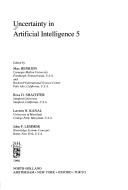
ISBN: 0444887385 9780444887382 0444887393 9780444887399 1322472653 1483296555 9781483296555 Year: 1990 Volume: v. 10 Publisher: Amsterdam, Netherlands : New York, New York : North-Holland, Elsevier Science Publishing Company, Inc.,
Abstract | Keywords | Export | Availability | Bookmark
 Loading...
Loading...Choose an application
- Reference Manager
- EndNote
- RefWorks (Direct export to RefWorks)
This volume, like its predecessors, reflects the cutting edge of research on the automation of reasoning under uncertainty.A more pragmatic emphasis is evident, for although some papers address fundamental issues, the majority address practical issues. Topics include the relations between alternative formalisms (including possibilistic reasoning), Dempster-Shafer belief functions, non-monotonic reasoning, Bayesian and decision theoretic schemes, and new inference techniques for belief nets. New techniques are applied to important problems in medicine, vision, robotics, and natural language und
Artificial intelligence. --- Uncertainty (Information theory) --- Reasoning. --- Intelligence artificielle --- Incertitude (Théorie de l'information) --- Raisonnement --- Measure of uncertainty (Information theory) --- Shannon's measure of uncertainty --- System uncertainty --- Information measurement --- Probabilities --- Questions and answers --- AI (Artificial intelligence) --- Artificial thinking --- Electronic brains --- Intellectronics --- Intelligence, Artificial --- Intelligent machines --- Machine intelligence --- Thinking, Artificial --- Bionics --- Cognitive science --- Digital computer simulation --- Electronic data processing --- Logic machines --- Machine theory --- Self-organizing systems --- Simulation methods --- Fifth generation computers --- Neural computers
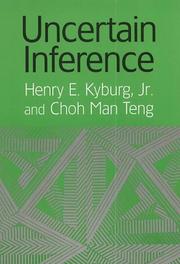
ISBN: 0521001013 0521800641 110712249X 9786610430291 0511174799 0511020686 0511154844 0511302398 051161294X 128043029X 0511047487 9780521001014 9780521800648 9780511020681 9780511612947 6610430292 9780511174797 9780511154843 9780511302398 9780511047480 Year: 2001 Publisher: Cambridge, UK ; New York : Cambridge University Press,
Abstract | Keywords | Export | Availability | Bookmark
 Loading...
Loading...Choose an application
- Reference Manager
- EndNote
- RefWorks (Direct export to RefWorks)
Coping with uncertainty is a necessary part of ordinary life and is crucial to an understanding of how the mind works. For example, it is a vital element in developing artificial intelligence that will not be undermined by its own rigidities. There have been many approaches to the problem of uncertain inference, ranging from probability to inductive logic to nonmonotonic logic. Thisbook seeks to provide a clear exposition of these approaches within a unified framework. The principal market for the book will be students and professionals in philosophy, computer science, and AI. Among the special features of the book are a chapter on evidential probability, which has not received a basic exposition before; chapters on nonmonotonic reasoning and theory replacement, matters rarely addressed in standard philosophical texts; and chapters on Mill's methods and statistical inference that cover material sorely lacking in the usual treatments of AI and computer science.
Uncertainty (Information theory) --- Probabilities --- Logic, symbolic and mathematical. --- Logic, Symbolic and mathematical. --- Probabilities. --- Uncertainty (Information theory). --- Ergodic theory. Information theory --- Artificial intelligence. Robotics. Simulation. Graphics --- Mathematical logic --- Incertitude (Théorie de l'information) --- Probabilités --- Logique symbolique et mathématique --- Arts and Humanities --- Philosophy --- Probability --- Statistical inference --- Combinations --- Mathematics --- Chance --- Least squares --- Mathematical statistics --- Risk --- Algebra of logic --- Logic, Universal --- Symbolic and mathematical logic --- Symbolic logic --- Algebra, Abstract --- Metamathematics --- Set theory --- Syllogism --- Measure of uncertainty (Information theory) --- Shannon's measure of uncertainty --- System uncertainty --- Information measurement --- Questions and answers
Book
ISBN: 9781400067824 9780679645276 Year: 2012 Publisher: New York, N.Y. Random House
Abstract | Keywords | Export | Availability | Bookmark
 Loading...
Loading...Choose an application
- Reference Manager
- EndNote
- RefWorks (Direct export to RefWorks)
"The acclaimed author of the influential bestseller The Black Swan, Nicholas Nassim Taleb takes a next big step with a deceptively simple concept: the "antifragile." Like the Greek hydra that grows two heads for each one it loses, people, systems, and institutions that are antifragile not only withstand shocks, they benefit from them. In a modern world dominated by chaos and uncertainty, Antifragile is a revolutionary vision from one of the most subversive and important thinkers of our time. Praise for Nicholas Nassim Taleb "[This] is the lesson of Taleb. and also the lesson of our volatile times. There is more courage and heroism in defying the human impulse, in taking the purposeful and painful steps to prepare for the unimaginable."--Malcolm Gladwell, author of The Tipping Point "[Taleb writes] in a style that owes as much to Stephen Colbert as it does to Michel de Montaigne."--The Wall Street Journal "The most prophetic voice of all. [Taleb is] a genuinely significant philosopher. someone who is able to change the way we view the structure of the world through the strength, originality and veracity of his ideas alone."--GQ "Changed my view of how the world works."--Daniel Kahneman, Nobel laureate"-- "Examples of Antifragility: When you stress your body by lifting a big weight, your body gets stronger. New York has the best restaurants in the world because particular restaurants are always going bust, making the aggregate stronger and stronger, or antifragile. Evolution is antifragile. Certain business and investment strategies are antifragile. Older things tend to be more antifragile than newer ones - because they've been exposed to more Black Swans"--
Civilisation --- Philosophy --- Uncertainty (Information theory) --- Forecasting. --- Complexity (Philosophy) --- Incertitude (Théorie de l'information) --- Prévision --- Complexité (Philosophie) --- Social aspects --- Aspect social --- AA / International- internationaal --- 10 --- 203 --- 305.6 --- 519.72 --- 659.113.5 --- Wijsbegeerte. --- Sociografie. Algemene beschrijving van de gemeenschappen (Sociologie). --- Risicotheorie, speltheorie. Risicokapitaal. Beslissingsmodellen. --- Information theory: mathematical aspects --- Forecasting, projections of results --- 659.113.5 Forecasting, projections of results --- 519.72 Information theory: mathematical aspects --- Incertitude (Théorie de l'information) --- Prévision --- Complexité (Philosophie) --- beleid, cultuur, gedrag, organisatie, maatschappelijk, strategie, verandering, wendbaarheid --- Forecasting --- Measure of uncertainty (Information theory) --- Shannon's measure of uncertainty --- System uncertainty --- Information measurement --- Probabilities --- Questions and answers --- Forecasts --- Futurology --- Prediction --- Emergence (Philosophy) --- Wijsbegeerte --- Sociografie. Algemene beschrijving van de gemeenschappen (Sociologie) --- Risicotheorie, speltheorie. Risicokapitaal. Beslissingsmodellen --- Wetenschap. --- Wetenschapsfilosofie. --- Antifragiel.
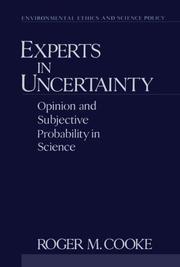
ISBN: 0195064658 9786610525027 1280525029 0195362373 9780195362374 9780195064650 019773037X Year: 1991 Volume: vol *3 Publisher: New York : Oxford University Press,
Abstract | Keywords | Export | Availability | Bookmark
 Loading...
Loading...Choose an application
- Reference Manager
- EndNote
- RefWorks (Direct export to RefWorks)
This volume contains an extensive survey and critical examination of current views on the use of expert opinion in scientific inquiry and policy-making.
Philosophy of science --- Besluitvorming --- Besluitvormingsanalyse --- Besluitvormingsprocessen --- Deciding --- Decision analysis --- Decision making --- Decision processes --- Decision-making --- Décision [Prise de ] --- Décision [Théorie de la ] --- Indetermination (Theorie de l'information) --- Making decisions --- Management decisions --- Management--Beslissingen --- Management--Besluitvorming --- Management--Decision making --- Onzekerheid (Informatietheorie) --- Prise de décision --- Probabiliteit--Theorie --- Probabiliteitstheorie --- Probabilities --- Probabilité [Théorie de la ] --- Probabilités --- Théorie de la décision --- Uncertainty (Information theory) --- Waarschijnlijkheid--Theorie --- Waarschijnlijkheidstheorie --- Science --- Sciences --- Incertitude (Théorie de l'information) --- Methodology --- Philosophy --- Méthodologie --- Philosophie --- Decision making. --- Decision-making. --- Probabilities. --- Science. --- Science - Philosophy. --- Uncertainty (Information theory). --- Sciences - General --- Physical Sciences & Mathematics --- -Science --- -Uncertainty (Information theory) --- Decision (Psychology) --- Management --- Choice (Psychology) --- Problem solving --- Measure of uncertainty (Information theory) --- Shannon's measure of uncertainty --- System uncertainty --- Information measurement --- Questions and answers --- Natural science --- Science of science --- Probability --- Statistical inference --- Combinations --- Mathematics --- Chance --- Least squares --- Mathematical statistics --- Risk --- Methodology. --- Philosophy. --- Prise de décision --- Probabilités --- Incertitude (Théorie de l'information) --- Méthodologie --- Scientific method --- Normal science --- Logic, Symbolic and mathematical --- Science - Methodology.
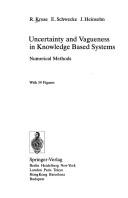
ISBN: 3540541659 0387541659 3642767044 3642767028 Year: 1991 Publisher: Berlin : Springer,
Abstract | Keywords | Export | Availability | Bookmark
 Loading...
Loading...Choose an application
- Reference Manager
- EndNote
- RefWorks (Direct export to RefWorks)
Artificial intelligence. --- Uncertainty (Information theory) --- Expert systems (Computer science) --- Fuzzy sets. --- Mathematical models. --- Intelligence artificielle --- Incertitude (Théorie de l'information) --- Systèmes experts (Informatique) --- Ensembles flous --- Modèles mathématiques --- Artificial intelligence --- Fuzzy sets --- Mathematical models --- 681.3*I24 --- Measure of uncertainty (Information theory) --- Shannon's measure of uncertainty --- System uncertainty --- Information measurement --- Probabilities --- Questions and answers --- Models, Mathematical --- Simulation methods --- Sets, Fuzzy --- Fuzzy mathematics --- Set theory --- Knowledge-based systems (Computer science) --- Systems, Expert (Computer science) --- Computer systems --- Soft computing --- AI (Artificial intelligence) --- Artificial thinking --- Electronic brains --- Intellectronics --- Intelligence, Artificial --- Intelligent machines --- Machine intelligence --- Thinking, Artificial --- Bionics --- Cognitive science --- Digital computer simulation --- Electronic data processing --- Logic machines --- Machine theory --- Self-organizing systems --- Fifth generation computers --- Neural computers --- Knowledge representation formalisms and methods: frames and scripts; predicate logic; relation systems; representation languages; procedural and rule-based representations; semantic networks (Artificial intelligence) --- Expert systems (Computer science). --- Uncertainty (Information theory). --- 681.3*I24 Knowledge representation formalisms and methods: frames and scripts; predicate logic; relation systems; representation languages; procedural and rule-based representations; semantic networks (Artificial intelligence) --- Incertitude (Théorie de l'information) --- Systèmes experts (Informatique) --- Modèles mathématiques
| Listing 1 - 9 of 9 |
Sort by
|

 Search
Search Feedback
Feedback About UniCat
About UniCat  Help
Help News
News